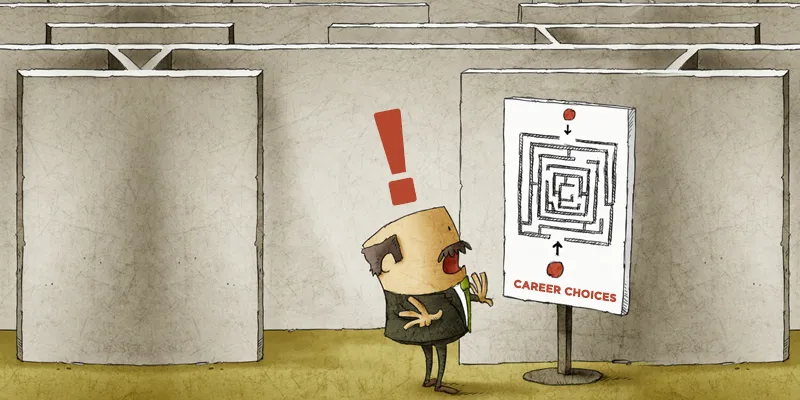Mid-career pangs - Most working professionals worry about
Mid-level professionals often find themselves at a crossroads with difficult choices to make in their careers. This is when the ambitious young Indian working professional sits down to ‘retrospect’.
While most of them look around for allied work areas and make a job switch, some choose to settle for a two-day course or a 15-hour online course and then search for a job that leads to the next level of growth.

The initial phase after the job switch always looks very positive, but they soon realise that there has been no real change. The intent, the commitment, and the problem at hand was addressed, yet one is back to square one.
While India aspires to be a knowledge economy, the working professional also wants to be part of it. However, according to a 2014 report by the Asian Development Bank, India ranked 109th among 145 countries in Knowledge Economy Index, with a score of 3.06. The average for Asia-Pacific region was 4.39, compared with 8.25 in the cases of OECD counties.
Why do Indian professionals seek mid-career course correction?
The root cause is India’s education system. An alarming 40 percent of the faculty positions in India’s top most Institutes are vacant - IITs, IIITs, Central Universities and IIMs top this list. The situation is worse in other universities (600 positions) and institutes (35,000 positions). With sub-standard education, Indian graduates are not able to perform the jobs assigned to them at the workplace as expected. Most working professionals realise this as soon as they start working.
While initially they put in all efforts to learn the job, eventually they face skill-gap crisis and realise that their degrees do not hold great vocational values. The situation is magnified for people who could not educate themselves in the premier institutes like NITs/IITs/IIMs and thus always have a steep climb up the corporate ladder.
Shortcuts not the way
When young working professionals finally make up their mind to realign their career path, they fall into the trap of taking a shortcut and doing a short course. In the yesteryear, the mass working professionals, in order to catapult their career, would land up at a typing institute. Later, the trend was shorthand writing and then it was telephone receptionist training. Much later it moved to learning computer courses such as JAVA, etc.
Doing a short course is good for mid-term correction. But, it is like doing a superficial repair of a damaged part of the bike. Someday it collapses and then one continues to take the bike back to the workshop again and again, until one day a complete overhaul is mandated. Thus, a complete overhaul ‑ read re-education and not short training intervention ‑ is the solution for a long-term gain for working professionals.
For a mid-career reinvention, do not think of short-term correction and enroll in a short course. Retrospect well on the cause of the crisis and if you feel you can overcome it through education, decide to re-educate (read longer duration education).
According to the Community College Research study on adult learning and workplace growth in the US, “Since short-term training that is focussed on getting low-skilled adults a job, generally does not result in earnings gains over time when students do not continue their education. Colleges could help students avoid dead-end starts by ensuring that short-term training options lead to real educational attainment in the long term.”
Reality check
The ground reality, however, is that the average working professional cannot take academic sabbaticals. Community Colleges in the US had come forward to support this demand and many mid-career professionals benefited by attending evening and weekend classes in neighbourhood institutes. This scenario is also witnessing a revolution with implementation of technology in education, world over.
Technology making re-education easier
Due to the immense growth in technology, for the new-age working professionals, the pain to re-educate and going back to school is much easier and simpler today. They, however, have a choice. When they graduated, they only had access to low quality faculty in the neighbourhood. However, today the best institutions are being able to provide them quality education taught by the limited but best of faculty, and learners are able to access through their laptops and mobiles. What is even better is that they don’t have to take the two-year academic sabbatical.
It has become very convenient with technology platforms that give them better than classroom experience in some cases.
Conclusion
With more and more Indian working professionals going back to school without quitting their jobs or taking a sabbatical, India Inc. tends to benefit and improve workplace productivity, which is being pegged at 15 percent of US Inc.’s productivity.
Indian working professional can now dream of making it big. Choice is with them to act now and not settle for short correction, but rethink and indulge in a mid-career longer duration re-education using technology without taking time off work.
At a time when workplace success is largely mapped on skills; skill enhancement needs to be a continuous process. Thankfully, today’s technology can facilitate seamless learning and every working professional can leverage the option and opportunity to re-educate oneself.







